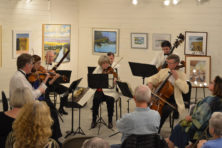Midsummer’s Music Festival kicks off in an English style
- Share
- Tweet
- Pin
- Share
By Jim Lundstrom
@JimstromPulse
As a recent convert to English classical music – after attending an Elgar-heavy performance by the BBC Concert Orchestra earlier this year – I looked forward to Friday’s opening night of the Midsummer’s Music Festival at Birch Creek with its theme In An English Country Garden.
Elgar was not on the program, but he was described by Midsummer’s president and artistic director James Berkenstock in his excellent introduction to the works as one of the pillars of English music of the late 19th and early 20th centuries. The other pillar of that period is Sir Charles Villiers Stanford, who was on the program. More about him later.
The festival kicked off its 23rd season with a brief performance by the Door County String Academy, which performs the important function of string instruction since Door County public and private schools do not include string or orchestra in their curricula.
Midsummer’s Music Festival musicians opened the season with Gerald Finzi’s haunting Interlude in A Minor for oboe and string quartet. As far as I know, I was hearing Finzi for the first time, and it was certainly the first time hearing this gorgeous work.
The exotic oboe snaking through the cascading strings filled the beautiful and alive-sounding hall at Birch Creek with exquisite melancholy. Oboist Margaret Butler draws out so many colors and textures in the 12 minutes or so of this amazing work, while cellist Walter Preucil, violinist David Perry and violist Sally Chisholm at times support, at others antagonize the mournful oboe. I felt this performance deserved a standing ovation, but apparently I was the only one who felt that way because the rest of the audience reserved their SOs for the next two works.
An almost-forgotten work by Ralph Vaughan Williams finished off the first half of the concert, the Quintet in D Major. It was almost forgotten because Vaughan Williams wanted it that way. It’s one of the early works composed before he studied with Ravel in Paris in 1908. He destroyed pre-Ravel orchestral works and put the chamber works away, feeling they didn’t represent him well. Upon his death in 1958, Elgar’s widow, Ursula, donated the early works to the British Library, with an embargo stipulation. In the 1990s she changed her mind and allowed the works to be released (she died at the age of 96 on Oct. 23, 2007). The first modern performance of the work took place in 2001, 100 years after its 1901 debut.
The Quintet is unusual in that it is voiced by clarinet (William Helmers), horn (John Fairfield), violin (David Perry), cello (Walter Preucil) and piano (William Billingham), a combination of instruments that is rarely heard together, although Berkenstock mentioned that Midsummer’s musicians have performed works with the same instrumentation by Zdenek Fibich and Robert Kahn. The youthful work was charming and played with great beauty deserving of the standing ovation it received.
Working its way back from the latest composer to earliest, the evening concluded with Stanford’s Quartet No. 1 in F Major, Opus 15. Absolutely brilliant playing throughout, but this early work (1879) did not transport me the way the first two pieces did.
But don’t take my word for it. The program will be repeated Weds., June 12, at Bjorklunden, Baileys Harbor, at 7:30 p.m. For more information on the season’s offerings, visit midsummersmusic.com.


